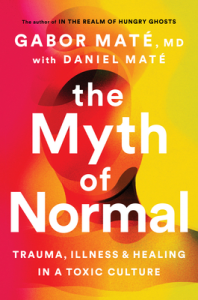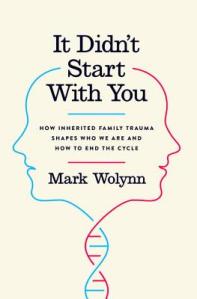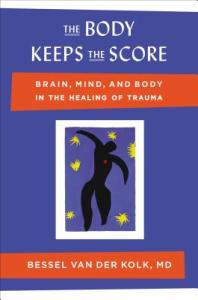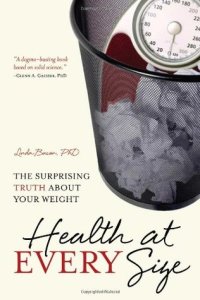Title: The Myth of Normal: Trauma, Illness, and Healing in a Toxic Culture
Author: Gabor Maté with Daniel Maté
Genre: Psychology/Health
Trigger Warnings: Chronic illness, terminal illness, pedophilia/childhood sexual abuse, rape, incest, domestic partner abuse, abandonment, war (mentions), cancer
Note: Trigger warnings in DNF books only cover the part I read. There may be triggers further in the book that I did not encounter.
Read To: 25%
Back Cover:
In this revolutionary book, renowned physician Gabor Maté eloquently dissects how in Western countries that pride themselves on their healthcare systems, chronic illness and general ill health are on the rise. Nearly 70 percent of Americans are on at least one prescription drug; more than half take two. In Canada, every fifth person has high blood pressure. In Europe, hypertension is diagnosed in more than 30 percent of the population. And everywhere, adolescent mental illness is on the rise. So what is really “normal” when it comes to health?
Over four decades of clinical experience, Maté has come to recognize the prevailing understanding of “normal” as false, neglecting the roles that trauma and stress, and the pressures of modern-day living, exert on our bodies and our minds at the expense of good health. For all our expertise and technological sophistication, Western medicine often fails to treat the whole person, ignoring how today’s culture stresses the body, burdens the immune system, and undermines emotional balance. Now Maté brings his perspective to the great untangling of common myths about what makes us sick, connects the dots between the maladies of individuals and the declining soundness of society—and offers a compassionate guide for health and healing. Cowritten with his son Daniel, The Myth Of Normal is Maté’s most ambitious and urgent book yet.
Review:
I have read a LOT about trauma and its effects over the past few years (e.g. here, here, here, and here). This is a topic of personal interest for me, as well as one where, at this point, I feel fairly well-versed. From the emphasis on the back cover, I thought this was going to be about the many small and not-so-small traumas we face every day because of how society is set up (the “toxic society” promised in the subtitle) and how those affect our health. I expected something more along the lines of Sedated than anything.
I’m going to refer to author in the singular here because even though the book tries to emphasize that Daniel also had a large hand in the writing of the book, the concepts and ideas are obviously all Gabor’s.
The main premise of The Myth of Normal is that modern medicine’s fundamental assumptions about human health are wrong – that the mind and body are not and can never be truly separated, and that trying to treat illness as separate from the person’s life circumstances is short-sighted and misses essential underlying factors that affect a disease’s onset, progression, and treatment. All of which I do agree with. However, for all its emphasis on challenging fundamental assumptions, the book itself refuses to challenge or even acknowledge the fundamental assumptions that drive it:
- There exists a state of perfect health which is possible for humans to achieve;
- Achieving this state is both possible and essential for every human being;
- Therefore, the ultimate goal (or one of the ultimate goals) of every human being should be to work to achieve this state.
To be fair, Gabor is a doctor and he likely doesn’t realize he is making those three assumptions in this book. These are underlying assumptions of our society as well – just look at any health, diet, or weight loss claim. Once you know to look for them, you’ll see these assumptions everywhere. So I don’t really blame Gabor for writing from that perspective. It’s great that he’s on board with the growing body of evidence about trauma’s effects on physical health. I think he just didn’t go far enough in the “challenging society’s assumptions about health” aspect.
There is a lot of research presented here, so I do give him credit for that. It’s not really anything I didn’t get from The Body Keeps the Score (Gabor even quotes Bessel van der Kolk several times), but if you’re not familiar with the concepts and the research, I think it would be a good introduction. Where I had issues was all the parts that weren’t research. The anecdotes and stories were incredibly sensationalized. It was always someone with a horrible and fatal disease going from being bed-bound to living a pretty much normal life due to healing from horrific childhood sexual abuse. Nobody was healing from schoolyard bullying or their parents’ divorce and as a result seeing improvement in their back pain or having fewer headaches. It was always people with something dramatic and incurable who healed their trauma and therefore fixed their disease.
As someone who is disabled/chronically ill, I’ve heard all of the “one weird trick to heal your incurable disease! Doctors are amazed!” stuff. And if you strip away the scientific trappings, what Gabor is presenting sounds exactly like the “natural cure without drugs!” bullshit you find in weird alternative health circles. Take out the fact that Gabor is a doctor and cut the parts where he cites research and you could replace “trauma healing” with “kale,” “yoga,” “unpronounceable exotic herb,” or whatever else in every single anecdote and it would sound exactly as outlandish. Gabor is pretty much promising that healing your trauma will fix anything and everything wrong with you, up to and including incurable and fatal conditions.
I don’t want to deny the fact that there is research. Unlike most “cures” in this non-medical modes of healing space, the trauma-health connection actually has a lot of promising research around it. Which I think is why I take such issue with the way it’s presented here. Could healing your trauma help your physical health? Absolutely, and there’s research to back that up. Will healing your trauma cure your cancer? I can’t bring myself to believe that, no matter how fancy the credentials of the doctor telling me the story.
This book may have fallen prey to the whims of marketing, ignoring scientific nuance in favor of something that will sell – and sensationalism sells. Or maybe Gabor completely believes in trauma healing as a miracle cure. I don’t know. But regardless, I don’t recommend this one. The concepts and research are good, but you can get the same information in other books (I recommend The Body Keeps the Score and It Didn’t Start With You) with many fewer issues. The effects of trauma on physical health are worth learning about. But not from this book.




